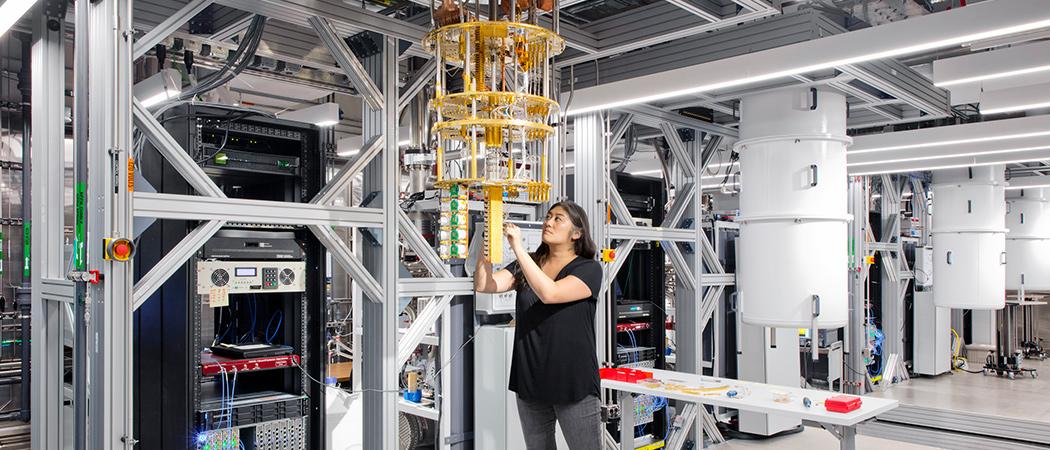The government invested more than C$1B in quantum research from 2009 – 2020, following up with C$360M for a national quantum strategy in 2021. The sector is seen as key to the economy, as the science matures and more sectors adopt the technology

IBM Quantum scientist in lab. Photo: IBM
A small company made waves recently when it claimed it had demonstrated a significant milestone toward building a fault-tolerant quantum computer in a Nature paper.
The company, Xanadu Quantum Technologies is not based in the well-known hotbeds of quantum science, the US, EU or China. It is in Canada, which is sparking a home grown revolution in a bid to compete strongly in the international quantum technologies market in its own right and with cross-Atlantic partnerships.
Canada already has 23 startup quantum technology companies, second only to the US with 59, according to McKinsey & Co. It also is among the top 10 countries worldwide in planned public funding for quantum technology at more than $600 million, a number that is growing but still behind China with $15 billion, the EU with $7.2 billion and the US with $1.3 billion, McKinsey said.
The government has made a series of strategic investments intended to make Canada a go-to place for quantum research and investment. Along with some 15 countries worldwide, it has a well-defined national initiative in quantum technology, with $23 billion of funding announced as of January 2022, according to KPMG. It expects the industry, which is still in its early stages of exploration, to be able to solve problems today’s computers cannot, creating a $86 billion industry by 2040.
Canada expects to reap big benefits from the emerging field. The total economic impact of quantum technologies in Canada is expected to reach C$533 million ($411.2 million) with 1,100 jobs by 2025, according to a study by the National Research Council of Canada (NRC). In 2045, the NRC estimated that number will reach almost C$139 billion, with more than 209,000 jobs.
Quantum computers solve problems much faster and with less energy than classical binary computers. Potential commercial applications include healthcare, finance, materials design, defence and clean technologies.
Quantum computers, sensors and other devices are so important to the national economy and security that Canada is putting C$360 million into its National Quantum strategy programme to focus on growing quantum-ready technologies, companies, and workforce and solidifying the country’s global leadership in quantum technology. The national government is expected to release a detailed report on the plan early this autumn.
Early lead in research
The economic development agency FedDev Ontario said this week that it will award more than C$23 million over six years to help businesses advance and commercialise quantum technologies as a step to advance the National Quantum strategy programme in southern Ontario. It will accept applications until 20 September.
Phil Kaye, programme director of the Applied Quantum Computing Challenge at NRC, said the National Quantum strategy reflects academics and the commercial community working closely together.
One strength Canada has is that different companies are working on different quantum technologies, he said. One, D-Wave uses a technique called quantum annealing that has an optimisation process, while Xanadu is using a photon computer and others are individually addressing quantum bits, or qubits.
“We don’t know what technology will win the race,” Kaye said. “So we are trying different technologies.”
Kaye said Canada had an early foothold in quantum technology because of work at its academic institutions. Gilles Brassard, a professor at the University of Montreal, invented quantum cryptography. Some of the earliest work on quantum computer algorithms was done by Canadian researchers, Kaye said. “So we had a very early foothold in the space from academic expertise.”
The University of Waterloo is among the Canadian universities with a strong quantum technology focus, including its Institute for Quantum Computing. It is listed by The Quantum Insider among the 12 best quantum computing universities and graduate programmes. The list includes Oxford and Harvard universities.
Others Canadian universities with strong quantum research efforts are the University of Calgary, University of Montreal, University of British Columbia and the University of Sherbrooke. Dozens of startups out of academia already are working on the components needed to build a quantum computer.
The University of Sherbrooke’s Quantum Institute has a collaboration with IBM, becoming the first IBM Q Space hub in Canada, with exclusive cloud-based access to the US company’s most advanced quantum computer systems and software. The collaboration is supported by the provincial government of Quebec.
Meanwhile, the University of Calgary will get C$23 million from the provincial government in Alberta over the next five years for its Quantum City Initiative hub for quantum training, research, and innovation.
“Calgary getting this investment matters a lot because we don’t have to be followers in this technology,” Barry Sanders, scientific director of Quantum City, said when the hub was announced earlier this month. “We could be prime movers, which means that we could be creators of the ideas, we can create high-level jobs and be a talent generator.”
Alberta is known for oil production and not necessarily technology development, but that is changing, said Raymond Laflamme, chair in quantum innovation at the University of Waterloo, Ontario, and founding director of the university’s Institute for Quantum Computing,
The institute has about 30 faculty, 75 postdocs, and 150 to 200 students. It is a key part of the Quantum Valley Ideas Lab ecosystem in Waterloo, which also includes a venture capital company.
The impetus behind the ecosystem and the institute was BlackBerry founder Mike Lazaridis, who invested C$100 million to start the institute and has invested in the Quantum Valley and other quantum efforts.
Laflamme said it is a good start to building an ecosystem. “Canada punches over its weight,” he said.





 A unique international forum for public research organisations and companies to connect their external engagement with strategic interests around their R&D system.
A unique international forum for public research organisations and companies to connect their external engagement with strategic interests around their R&D system.